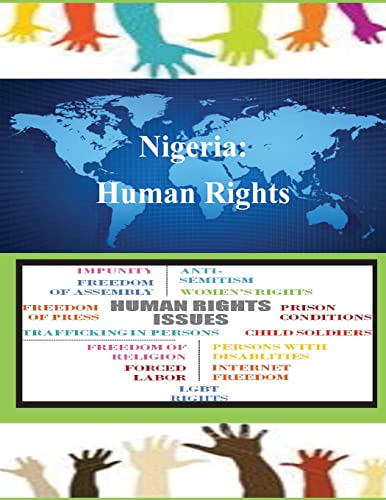Items related to Nigeria: Human Rights

Nigeria is a federal republic composed of 36 states and the Federal Capital Territory (FCT). In 2010 then Vice President Goodluck Jonathan, of the governing Peoples Democratic Party (PDP), assumed the presidency following the death of President Yar’Adua. In 2011 President Jonathan was elected as president to a four-year term, along with Vice President Mohammed Namadi Sambo, also of the PDP. International and domestic election observers considered the 2011 presidential, gubernatorial, and legislative elections to be generally credible and orderly, although marred by violence, fraud, and irregularities. The Supreme Court of Nigeria ultimately upheld the results of the presidential election, while the Court of Appeals upheld the results of most other contests. Authorities failed at times to maintain effective control over the security forces. Security forces committed human rights abuses. The insurgency in the Northeast of militant terrorist sect Jama’atu Ahlis Sunna Lidda’awati Wal-Jihad, better known as Boko Haram (which translates to “Western education is forbidden”), continued. Casualties and human rights abuses associated with Boko Haram attacks and the government’s response escalated. On April 24, President Jonathan inaugurated a Committee on Dialogue and Peaceful Resolution of Security Challenges in the North. Self-appointed Boko Haram spokespersons rejected dialogue or amnesty. On May 14, President Jonathan declared a six-month state of emergency in Borno, Yobe, and Adamawa states, which was extended for another six months on November 20. The most serious human rights abuses during the year were those committed by Boko Haram, which conducted killings, bombings, abduction and rape of women, and other attacks throughout the country, resulting in numerous deaths, injuries, and widespread destruction of property; those committed by security services, which perpetrated extrajudicial killings, torture, rape, beatings, arbitrary detention, mistreatment of detainees, and destruction of property; and widespread societal violence, including ethnic, regional, and religious violence. Other serious human rights problems included vigilante killings; prolonged pretrial detention; denial of fair public trial; executive influence on the judiciary; infringements on citizens’ privacy rights; restrictions on the freedoms of speech, press, assembly, religion, and movement; official corruption; violence against women; child abuse; female genital mutilation/cutting (FMG/C); infanticide; sexual exploitation of children; trafficking in persons; discrimination based on sexual orientation, gender identity, ethnicity, regional origin, religion, and disability; forced and bonded labor; and child labor. Impunity remained widespread at all levels of government. The government brought few persons to justice for abuses and corruption, and the president pardoned a former governor convicted on six counts of corruption. Police and security forces generally operated with impunity. Authorities did not investigate the majority of cases of police abuse or punish perpetrators.
"synopsis" may belong to another edition of this title.
- PublisherCreateSpace Independent Publishing Platform
- Publication date2014
- ISBN 10 1502865254
- ISBN 13 9781502865250
- BindingPaperback
- Number of pages56
Buy New
Learn more about this copy
US$ 20.10
Shipping:
US$ 11.23
From United Kingdom to U.S.A.
Top Search Results from the AbeBooks Marketplace
Nigeria: Human Rights
Published by
Createspace Independent Publishing Platform
(2014)
ISBN 10: 1502865254
ISBN 13: 9781502865250
New
Paperback / softback
Quantity: > 20
Seller:
Rating
Book Description Paperback / softback. Condition: New. This item is printed on demand. New copy - Usually dispatched within 5-9 working days. Seller Inventory # C9781502865250
Buy New
US$ 20.10
Convert currency

